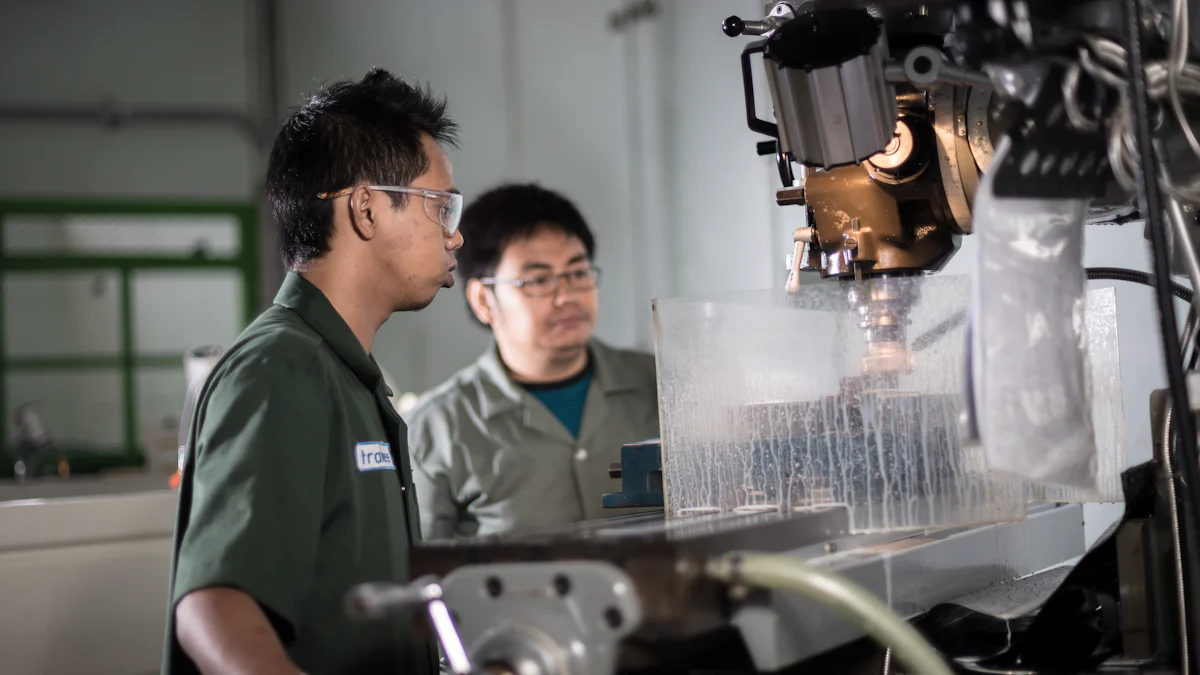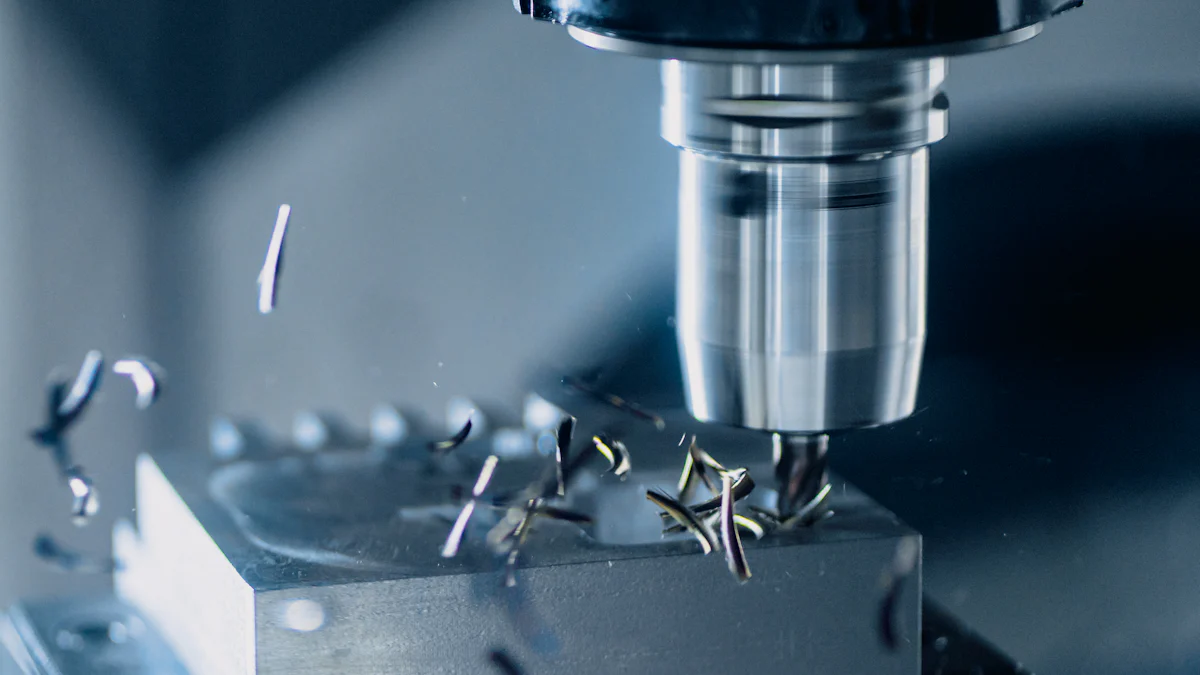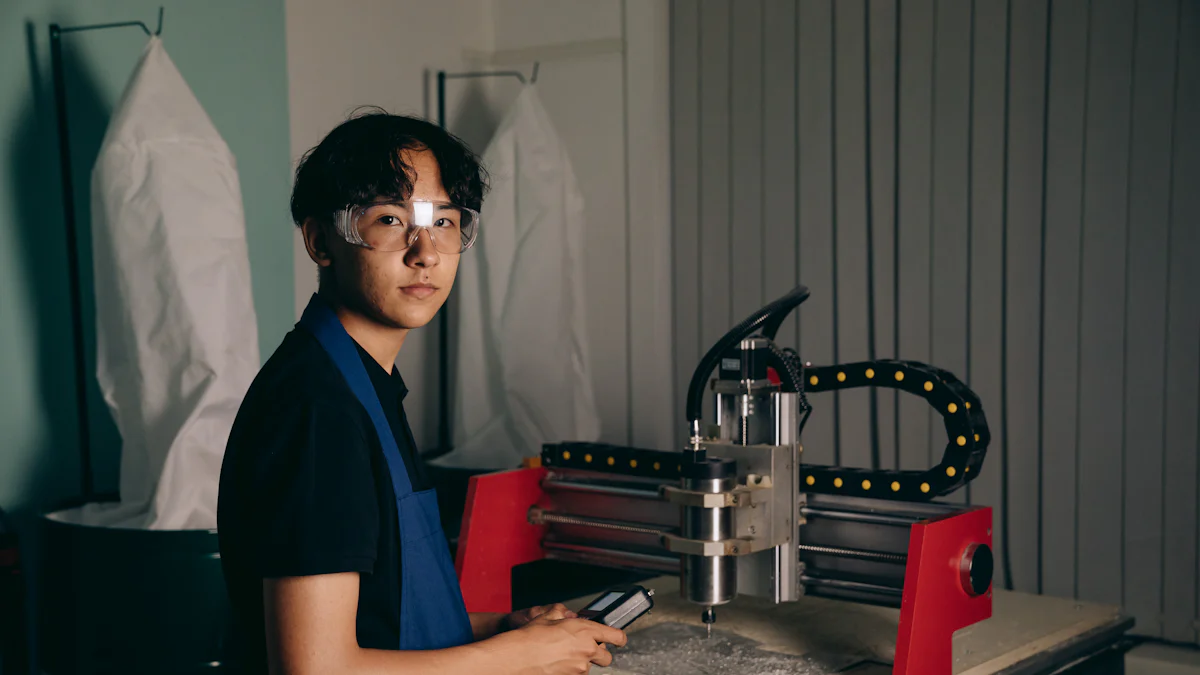How to Choose a CNC Service Provider

Choosing a CNC machining service provider can feel overwhelming. You must evaluate technical capabilities, customer service, and scalability. Many businesses struggle with assessing quality assurance processes, workforce skills, and data security. Robust quality control measures, such as regular inspections and error correction policies, are essential. A reliable provider ensures precision and consistency in every project. Effective communication and flexibility also play a key role in meeting your unique needs. By focusing on these factors, you can find a partner who delivers high-quality results and supports your goals.
Key Takeaways
Look at the CNC machines they have. Pick a provider with tools that fit your project needs.
Check how they ensure quality. Find providers who use accurate tools and do regular checks for good results.
See how much experience they have. Choose someone with success in your field for better trust.
Make sure they communicate well. A good provider will update you and fix problems quickly.
Think about eco-friendly practices. Pick a provider that uses green materials and methods to help the environment.
Assessing CNC Machining Capabilities

Tools and Equipment
Types of CNC machines available (e.g., 3-axis, 5-axis, lathes, mills)
When evaluating a CNC machining provider, you should first examine the types of CNC machines they offer. Machines like 3-axis and 5-axis CNC systems, lathes, and mills each serve different purposes. For example, 3-axis machines move along the X, Y, and Z axes, making them suitable for simpler parts. In contrast, 5-axis machines add rotational movements along the A and B axes, enabling the creation of intricate shapes and deep cuts.
Factor | 3-Axis | 5-Axis |
|---|---|---|
Cutting tool movement | Moves along X, Y, Z axes | Moves along X, Y, Z, A, and B axes |
Efficiency | Good | Excellent, quick |
Tool changes | Multiple setups needed | Minimal, works from different angles |
Capabilities | Limited, no complex shapes | Can make deep cuts and intricate shapes |
Accuracy | Good | Excellent |
Cost | $25,000 to $50,000 | $80,000 to over $500,000 |
Advanced technologies like multi-axis machining or automation
Advanced technologies like multi-axis machining and automation significantly enhance efficiency and precision. Multi-axis machining reduces the need for repositioning, which helps maintain accuracy. It also allows for the production of complex geometries in a single setup, saving time and reducing errors. Automation further streamlines processes, ensuring consistent quality and faster turnaround times.
Multi-axis machines perform multiple operations in one setup, saving time and reducing errors.
They sustain constant accuracy throughout the machining process, which is crucial for high-precision manufacturing.
Automation provides better surface finishes and improved drilling capabilities.
Software and CNC Programming Services
Importance of CAD/CAM software proficiency
Proficiency in CAD/CAM software is essential for delivering high-quality CNC programming services. Software like Autodesk Fusion 360, SolidWorks, and Mastercam enables precise designs and minimizes errors. A CNC machining provider skilled in these tools can handle intricate models and streamline workflows, reducing manual data transfer and potential mistakes.
Ability to handle complex designs and custom requirements
A provider's ability to handle complex designs depends on their mastery of CAD/CAM tools. For example, SolidWorks and AutoCAD allow for the creation of intricate models, while effective integration of CAD and CAM systems ensures seamless production. This technical expertise is vital for meeting custom requirements and achieving precision CNC machining.
Industry Expertise
Experience in your specific industry or application
Industry experience is a critical factor when choosing a CNC machining service provider. Industries like aerospace, automotive, and medical demand high accuracy and tight tolerances. For instance, the aerospace sector requires precision for safety-critical components like turbine blades, while the medical industry relies on CNC machining for custom implants and surgical tools.
Portfolio of past projects and case studies
Reviewing a provider's portfolio can give you insights into their technical expertise and industry experience. Successful projects, such as custom bodily implants in the medical field or intricate turbine blades in aerospace, demonstrate their ability to deliver high-precision manufacturing. A strong portfolio reflects their capability to meet diverse requirements across industries.
Evaluating Quality in CNC Machining Services
Quality Control Processes
Use of precision measurement tools and inspection protocols
To ensure a high-quality end product, a CNC machining provider must implement robust quality control processes. Precision measurement tools play a vital role in maintaining accuracy. Tools like calipers and micrometers measure external and internal dimensions with exceptional precision. Coordinate Measuring Machines (CMMs) are indispensable for inspecting complex geometries, ensuring parts fit together seamlessly. Surface roughness testers, such as profilometers, assess surface texture, which is critical for both functionality and aesthetics.
Inspection protocols further enhance the reliability of the quality assurance process. These include pre-machining inspections to verify raw materials, periodic checks during machining to monitor tool wear, and final inspections to confirm dimensions and surface finishes. Non-destructive testing (NDT) methods, such as ultrasonic or X-ray inspections, detect internal defects without damaging the part. By combining these tools and protocols, you can trust the service provider to deliver reliable quality.
Examples of quality assurance practices (e.g., first article inspection)
First article inspection (FAI) is a common practice in precision CNC machining. It involves producing an initial part to verify that all specifications meet the required standards before full-scale production begins. This step minimizes errors and ensures consistency. Other practices include machine calibration, automated in-process inspections, and statistical process control. These measures help maintain accuracy and reduce waste, resulting in a high-quality end product.
Certifications and Standards
ISO certifications (e.g., ISO 9001) and their significance
Certifications like ISO 9001 demonstrate a CNC machining provider's commitment to quality. ISO 9001 emphasizes customer satisfaction by requiring organizations to monitor feedback and address complaints effectively. It also promotes a process-based approach, reducing waste and improving operational efficiency. For you, this means working with a provider that prioritizes continuous improvement and delivers consistent results.
Industry-specific certifications (e.g., aerospace or medical standards)
Industry-specific certifications, such as AS9100 for aerospace or ISO 13485 for medical devices, elevate a provider's credibility. These certifications ensure strict adherence to quality management practices, reducing the risk of defects and ensuring compliance with regulatory requirements. They also open doors to specialized markets, allowing you to collaborate with a CNC machine shop that meets the highest industry standards.
Material and Finish Options
Availability of a wide range of materials (e.g., metals, plastics)
A reliable CNC machining provider should offer a diverse selection of materials to meet your project needs. Common options include metals like aluminum, steel, and brass, as well as plastics such as polypropylene and polycarbonate. Each material serves specific applications, from lightweight components to durable, high-strength parts. This variety ensures flexibility in design and functionality.
Surface finishes and post-processing capabilities
Surface finishes and post-processing options significantly impact the final product's quality. Techniques like polishing, heat treatment, and anodizing improve both aesthetics and mechanical properties. For example, smoother finishes reduce stress concentrations, enhancing the part's strength and durability. By choosing a provider with advanced post-processing capabilities, you can achieve the desired look and performance for your project.
Balancing Cost and Turnaround Time

Pricing Transparency
Importance of clear and detailed quotes
Clear and detailed quotes help you understand the costs associated with CNC machining services. A transparent quote should break down expenses, including material costs, machining time, and any additional services like finishing or assembly. This clarity allows you to plan your budget effectively and avoid surprises.
Avoiding hidden fees or unexpected costs
Hidden fees can disrupt your project budget. To avoid this, ask the CNC machining provider about all potential costs upfront. Factors like material selection, design complexity, and shipping can influence pricing. For example:
High-performance materials like titanium cost more than softer metals.
Complex designs require advanced machinery and skilled labor, increasing expenses.
Shipping costs depend on package weight, size, and distance.
By addressing these factors early, you can prevent unexpected charges.
Turnaround Time
Balancing speed with quality
Turnaround time is crucial for meeting deadlines, but rushing a project can compromise quality. Simple parts may take only a few hours, while complex components requiring special setups or hard-to-machine materials can take weeks. A good CNC machining provider balances speed with precision, ensuring high-quality results without unnecessary delays.
Availability of expedited services for urgent projects
If you need faster turnaround, inquire about expedited services. Many CNC machine shops offer rush order options for urgent projects. These services prioritize your order, reducing lead times while maintaining quality. Understanding their policies helps you plan for tight deadlines.
Value for Money
Comparing cost versus quality and service reliability
Evaluating value for money involves more than just comparing prices. Consider factors like quality assurance, technical capabilities, and customer service. For example:
Factor | Description |
|---|---|
Pricing Alignment | Ensure that their pricing structure aligns with your budget without compromising on quality. |
Quality Assurance Processes | Look for robust quality control measures, including regular checks and final inspections. |
Technical Capabilities | Assess their ability to understand complex designs and proficiency in various machining processes. |
Customer Service | Evaluate the responsiveness and reliability of their customer service. |
After-Sales Services | Consider the support offered post-delivery, including assistance with assembly or installation. |
Long-term benefits of choosing a reliable provider
Choosing a reliable CNC machining provider offers long-term benefits. Reliable machines ensure consistent quality and reduce defects. They also minimize downtime, increasing productivity. Although the initial cost may be higher, the long-term savings from fewer breakdowns and reduced maintenance maximize your return on investment.
Reviewing Customer Support and Communication
Responsiveness
Importance of timely responses to inquiries and updates
Timely responses are a hallmark of excellent customer support. A CNC machining service provider that promptly addresses your inquiries and provides regular updates demonstrates respect for your time and project goals. Quick communication ensures that any issues, such as design clarifications or material changes, are resolved without delaying production.
Indicator | Description |
|---|---|
Effective Communication | The service provider can promptly address queries and provide updates on progress. |
Quality Customer Service | A commitment to meeting customer expectations enhances reliability and responsiveness. |
Providers that set clear response time goals enhance accountability. For example, a policy of responding to emails within 24 hours ensures you receive the information you need to make timely decisions.
Availability of dedicated account managers or support teams
Having a dedicated account manager or support team simplifies communication. These professionals act as your primary point of contact, ensuring consistency and clarity throughout the project. They also help track progress, address concerns, and provide updates, making the process smoother and more efficient.
Communication Clarity
Clear explanations of technical details and processes
Clear communication is essential in CNC machining services. Providers should explain technical details, such as tolerances, dimensions, and material requirements, in a way that is easy to understand. Using visual aids like diagrams or CAD models can further enhance clarity. A glossary of terms can also help bridge any knowledge gaps, ensuring you and the provider are aligned.
Regular updates on project progress and timelines
Regular updates keep you informed about your project's status. A reliable CNC machine shop will share progress reports, including milestones achieved and any potential delays. This transparency builds trust and allows you to adjust your plans if necessary. For example, weekly updates can help you stay on top of production schedules and ensure timely delivery.
Problem Resolution
Handling revisions, errors, or unexpected challenges
Revisions and errors are common in precision CNC machining projects. Small coding errors can lead to defective parts, while tool wear may cause inconsistencies in mass production. A skilled provider will address these challenges by using advanced measurement tools and frequent testing to ensure each part meets specifications. They should also have the expertise to resolve software compatibility issues that could disrupt CNC programming services.
Policies for addressing customer concerns or complaints
Effective policies for handling complaints reflect a provider's commitment to customer satisfaction. These policies should include swift responses, clear communication, and a focus on resolving issues efficiently. Providers that gather feedback and continuously improve their services demonstrate reliability and a customer-first approach. For instance, tracking the implementation of solutions and monitoring customer opinions can help refine after-sales support.
Additional Considerations for Precision CNC Machining
Confidentiality and Security
Protecting intellectual property and sensitive designs
Protecting your intellectual property is critical when working with a CNC machining provider. You should ensure that the provider has robust measures in place to safeguard your designs. Clear agreements, such as contracts that define intellectual property ownership, help prevent misuse or theft. Monitoring and auditing the provider's activities can further reduce risks. Proactive steps, like assessing their security systems, ensure your sensitive designs remain protected throughout the collaboration.
Use of NDAs (Non-Disclosure Agreements) and secure systems
Non-Disclosure Agreements (NDAs) play a vital role in maintaining confidentiality. These agreements outline the terms of information sharing and establish penalties for breaches. Secure systems, such as encrypted data storage and restricted access, add another layer of protection. By combining NDAs with advanced security measures, you can confidently share your designs without fear of unauthorized use.
Vertical Integration
Benefits of providers offering end-to-end services (e.g., design, machining, assembly)
Vertical integration simplifies your project by keeping all operations under one roof. Providers offering end-to-end services handle everything from design to assembly. This approach reduces logistical challenges and ensures smoother workflows. You gain better control over the manufacturing process, which leads to consistent quality and faster delivery times.
Streamlining processes to reduce lead times and costs
Integrated services streamline processes by eliminating the need for multiple vendors. This reduces lead times and minimizes costs associated with outsourcing. For example, a single provider managing design, machining, and assembly ensures seamless transitions between stages. This efficiency translates to quicker project completion and lower overall expenses.
Sustainability Practices
Use of eco-friendly materials and processes
Sustainability in CNC machining focuses on reducing environmental impact. Providers adopting eco-friendly materials, such as recycled metals, contribute to greener manufacturing. Advanced techniques, like multi-axis computational machining, minimize material waste and energy usage. These practices not only benefit the environment but also improve efficiency.
Commitment to reducing waste and energy consumption
Energy-efficient tools and recycling programs play a significant role in reducing waste. Smart technologies, such as AI and machine learning, optimize operations and lower energy consumption. By choosing a provider committed to sustainability, you support efforts to reduce greenhouse gas emissions and conserve resources.
Choosing the best cnc machining partner involves evaluating their capabilities, quality, and customer support. You should also consider cost, turnaround time, and additional factors like confidentiality and sustainability. A reliable provider ensures precision and efficiency while meeting your unique requirements. By carefully assessing cnc machine shops based on these criteria, you can make an informed decision. This approach helps you achieve high-quality results and long-term success for your projects.
FAQ
What industries benefit the most from CNC machining services?
Industries like aerospace, automotive, medical, and electronics benefit greatly. CNC machining ensures precision and consistency, which are essential for safety-critical components, custom medical implants, and intricate electronic parts. You can rely on CNC machining for high-quality results in these demanding fields.
How do I know if a CNC provider can handle my project?
Check their portfolio and industry experience. Look for examples of similar projects they have completed. Ask about their capabilities, such as machine types, materials, and software expertise. This ensures they can meet your specific requirements.
Why are certifications important when choosing a CNC provider?
Certifications like ISO 9001 or AS9100 guarantee quality and compliance with industry standards. They show the provider’s commitment to precision and reliability. You can trust certified providers to deliver consistent results and meet regulatory requirements.
Can CNC machining providers work with custom designs?
Yes, most providers can handle custom designs. They use advanced CAD/CAM software to create precise models. Share your design files and requirements to ensure they can meet your specifications. This flexibility makes CNC machining ideal for unique projects.
How can I ensure my intellectual property stays secure?
Ask the provider to sign a Non-Disclosure Agreement (NDA). Verify their data security measures, such as encrypted storage and restricted access. These steps protect your sensitive designs and ensure confidentiality throughout the project.
See Also
Discovering CNC Machining Solutions for Accurate Production
Streamlined CNC Machining Solutions for Exact Manufacturing
Comprehensive Overview of CNC Milling Services You Should Understand
Uncovering Benefits of Aluminum CNC Machining Solutions
Tailored CNC Milling Solutions: Perfecting Precision Engineering Methods
About US
Follow Us
Your prototype holds unparalleled significance, and we deeply value its uniqueness. Collaborating with you during the preparation phase for running your prototype or parts is a commitment we gladly embrace. Whether it's a single part or a complex assembly, we are dedicated to selecting the optimal tools and pathways to bring your envisioned product to life.
At Precision Fab CNC Machining, we specialize in producing parts for prototypes, short runs, and high-volume production. Our prototyping machine capabilities extend across metal, plastic, and wood machining, with welding fabrication services available to complement and finalize your prototype if required.
Address
Address: Room320 10F, Building A,Nanshan international building, Dayawan District, Huizhou, Guangdong, 516001 China
Contacts
billy@timaycnc.com

